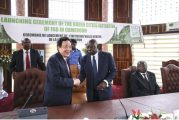Categories
Recent Posts
- Biya regime delays bond sale amid regional market strain
- Historic agreement between Nigeria and Cameroon to tackle wildlife crime
- Southern Cameroons refugees in Nigeria receive farm seedlings
- Douala: Investment Forum wraps up with honors for investment champions
- Understanding the Biya Francophone regime’s support for the Israeli genocide in Gaza
Archives
- April 2024
- March 2024
- February 2024
- January 2024
- December 2023
- November 2023
- October 2023
- September 2023
- August 2023
- July 2023
- June 2023
- May 2023
- April 2023
- March 2023
- February 2023
- January 2023
- December 2022
- November 2022
- October 2022
- September 2022
- August 2022
- July 2022
- June 2022
- May 2022
- April 2022
- March 2022
- February 2022
- January 2022
- December 2021
- November 2021
- October 2021
- September 2021
- August 2021
- July 2021
- June 2021
- May 2021
- April 2021
- March 2021
- February 2021
- January 2021
- December 2020
- November 2020
- October 2020
- September 2020
- August 2020
- July 2020
- June 2020
- May 2020
- April 2020
- March 2020
- February 2020
- January 2020
- December 2019
- November 2019
- October 2019
- September 2019
- August 2019
- July 2019
- June 2019
- May 2019
- April 2019
- March 2019
- February 2019
- January 2019
- December 2018
- November 2018
- October 2018
- September 2018
- August 2018
- July 2018
- June 2018
- May 2018
- April 2018
- March 2018
- February 2018
- January 2018
- December 2017
- November 2017
- October 2017
- September 2017
- August 2017
- July 2017
- June 2017
- May 2017
- April 2017
- March 2017
- February 2017
- January 2017
- December 2016
- November 2016
- October 2016
- September 2016
- August 2016
- July 2016
- June 2016
Featured
 Understanding the Biya Francophone regime’s support for the Israeli genocide in Gaza
Understanding the Biya Francophone regime’s support for the Israeli genocide in Gaza  Poverty under Biya: Cameroonians embrace Chinese language for brighter futures
Poverty under Biya: Cameroonians embrace Chinese language for brighter futures  Cameroon is broken: Who can fix it?
Cameroon is broken: Who can fix it?  Ethiopia: U.S Senator Cardin Statement on the Killing of Bate Urgessa
Ethiopia: U.S Senator Cardin Statement on the Killing of Bate Urgessa  Battle for the Unity Palace: ANNOUNCEMENT!
Battle for the Unity Palace: ANNOUNCEMENT!
Most Commented Posts
 4 Anglophone detainees killed in Yaounde
4 Anglophone detainees killed in Yaounde
19 comments Chantal Biya says she will return to Cameroon if General Ivo Yenwo, Martin Belinga Eboutou and Ferdinand Ngoh Ngoh are sacked
Chantal Biya says she will return to Cameroon if General Ivo Yenwo, Martin Belinga Eboutou and Ferdinand Ngoh Ngoh are sacked
13 comments Anglophone Nationalism: Barrister Eyambe says “hidden plans are at work”
Anglophone Nationalism: Barrister Eyambe says “hidden plans are at work”
12 comments The Anglophone Problem – When Facts don’t Lie
The Anglophone Problem – When Facts don’t Lie
12 comments Largest wave of arrest by BIR in Bamenda
Largest wave of arrest by BIR in Bamenda
10 comments
Latest Tweets
Featured
-

Biya regime delays bond sale amid regional market strain
-

Historic agreement between Nigeria and Cameroon to tackle wildlife crime
-

Southern Cameroons refugees in Nigeria receive farm seedlings
-

Douala: Investment Forum wraps up with honors for investment champions
-

Understanding the Biya Francophone regime’s support for the Israeli genocide in Gaza
-

US: Prosecution lays out ‘criminal conspiracy’ as Trump’s hush money trial opens
-

FAO formally launches Green Cities Initiative in Cameroon
© Cameroon Concord News 2024
2, February 2022
Guinea-Bissau president says many dead after ‘failed attack against democracy’ 0
President Umaro Sissoco Embalo of Guinea-Bissau on Tuesday said he survived heavy fire for five hours during an attempted coup which he claimed killed or injured many people in the unstable west African country.
Appearing in a video posted on the presidency’s Facebook page hours after gunfire was heard near a compound where he was chairing a Cabinet meeting, Embalo said some of the people involved had been arrested.
“The attackers could have spoken to me before these bloody events that have seriously injured many and claimed lives,” he said, without clearly indicating who was behind the unrest.
But Embalo said the failed coup was linked to decisions he had taken “notably to fight drug trafficking and corruption”.
Shortly before the video appearance, the president told AFP in a brief telephone call: “All is well” and added that the situation is “under control”.
Earlier on Tuesday, sustained gunfire was heard near the seat of government in the coup-prone West African state in what the African Union and a regional bloc called an “attempted coup”.
Heavily-armed men had surrounded the Palace of Government, where Embalo and Prime Minister Nuno Gomes Nabiam were believed to have been attending a cabinet meeting.
People were seen fleeing the area on the edge of the capital Bissau, near the airport.
Local markets were closed and banks shut their doors, while military vehicles laden with troops drove through the streets.
According to various accounts, in the early afternoon armed men were seen entering the government palace, which houses different ministries.
Some witnesses described the gunmen as military, others as civilians.
Gunfire could be heard for a large part of the afternoon when the complex was surrounded.
An AFP reporter was warned to leave the area by a man carrying a gun who pointed it at him.
The former Portuguese colony, just south of Senegal, is an impoverished coastal state of about two million people.
It has seen four military coups since gaining independence in1974, most recently in 2012.
In 2014, the country vowed to return to constitutional government, but it has enjoyed little stability since then, and the armed forces wield substantial clout.
A 36-year-old Frenchwoman living in Bissau, Kadeejah Diop, said she rushed to pick up her two children from school and witnessed armed troops entering the government complex.
“They made all the female workers leave. There was huge panic,” she told AFP by phone from her home. “Right now, we are holed up indoors. We have no news.”
Troops set up a security perimeter around the palace and kept people away.
A journalist, asking not to be named, reported that at the start of the afternoon the public television centre had been occupied by soldiers who refused to let staff leave. It was not clear if they were part of the coup bid or government loyalists.
African Union Commission chief Moussa Faki Mahamat expressed deep concern over the “attempted coup”.
An AU statement said he was following “with deep concern the situation in Guinea Bissau, marked by the attempted coup d’etat against the government”.
The Economic Community of West African States (ECOWAS) also issued a statement saying it “condemns this attempted coup” and urged soldiers to “return to their barracks”.
The bloc warned that it “holds the military responsible for the well-being” of the president and government members.
The United Nations said Secretary General Antonio Guterres was “deeply concerned with the news of heavy fighting in Bissau”.
He called for “an immediate end to the fighting and for full respect of the country’s democratic institutions,” the UN’s statement said.
Election turmoil
Embalo, a 49-year-old reserve brigadier general and former prime minister, took office in February 2020 after winning a second-round runoff election that followed four years of political in-fighting under the country’s semi-presidential system.
He was a candidate for a party called Madem, composed of rebels from the African Party for the Independence of Guinea and Cape Verde (PAIGC), which had led Guinea-Bissau to independence.
His chief opponent, PAIGC candidate Domingos Simoes Pereira, bitterly contested the result but Embalo declared himself president without waiting for the outcome of his petition to the Supreme Court.
Late last year, the armed forces chief said members of the military had been preparing to launch a coup while the president was on a working trip to Brazil.
Troops had been offering bribes to other soldiers “in order to subvert the established constitutional order”, armed forces head General Biague Na Ntam said on October 14.
The government spokesman denied his account the following day.
In addition to volatility, Guinea-Bissau struggles with a reputation for corruption and drug smuggling.
Its porous coastline and cultural ties have made it an important stop on the Africa trafficking route. In 2019, nearly two tonnes of cocaine were seized.
Three countries in West Africa – Mali, Guinea and Burkina Faso – have experienced military takeovers in less than 18 months.
The region’s mounting instability is scheduled to be discussed on Thursday at an ECOWAS summit in Accra, Ghana.
“It looks increasingly hard to argue against the idea of coup contagion,” Eric Humphrey-Smith, an analyst at risk consultancy Verisk Maplecroft, told Reuters.
“When added to successful coups in Mali, Burkina Faso, Guinea and Chad in the past year, there is no doubt that West African leaders are nervously looking over their shoulders.”
Source: REUTERS